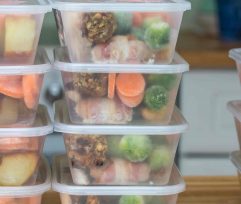It’s time to start caring more about our guts. That’s right. The terribly unsexy conversation is no longer reserved for the IBS/IBD population. Digestive health is relevant to us all.
Much like a second brain, the digestive tract possesses over one million nerve cells, major neurotransmitters and enkephalins (the body’s natural opiates). A weakened, stressed gut can therefore lead to mood swings, irritability and compromised, delayed delivery of key nutrients throughout the body. The gut is also home to a collection of diverse bacteria and yeasts. In fact, it’s said you have about five pounds of gut bacteria alone inside you (sorry, TMI). Sometimes, the “bad” bacteria can get out of hand and lead to body-wide weakening of defense forces, among a whole slew of other consequences. In other words, the effects of digestive health can lead to issues in almost every corner of the body, not just the classic irritable bowel symptoms.
So, are you ready to nurture your inner ecosystem? Here are five easy, simple steps to get you on the road to a happier, healthier gut.
1. Exercise
 Aerobic activities increase blood flow to organs, aiding the gastrointestinal tract with stronger contractions and increased production of digestive enzymes. Just make sure you give yourself an hour or so to naturally digest after meals before you start sweating. Consider trying some yoga classes as well. Certain positions and breathing exercises also aid in digestion and strengthening of the gastrointestinal tract.
Aerobic activities increase blood flow to organs, aiding the gastrointestinal tract with stronger contractions and increased production of digestive enzymes. Just make sure you give yourself an hour or so to naturally digest after meals before you start sweating. Consider trying some yoga classes as well. Certain positions and breathing exercises also aid in digestion and strengthening of the gastrointestinal tract.
2. Be Careful with Medications
Antibiotics can be lifesavers from acute, infectious diseases. But they should not be abused. Although helpful, these medications often kill off “good,” essential bacteria within our gut during the healing process. Even worse, a co-led study at the Universitat de Valéncia found that antibiotics have the ability to warp the microbial and metabolic patterns of the gut to irreversible degrees. Use antibiotics when you must, but avoid overuse. After such treatments, take extra measures to heal the compromised gut. A healing diet is particularly helpful, as I will explain below.
3. Consume Enough Fiber & Water Daily
Fiber feeds the “good” bacteria we need. In fact, when fiber is increased in the diet, continuous research shows a shift in microbial profile that correlates with a leaner physique. Why? Studies show that starved microbes tend to produce protective mucus linings that are suspected of causing disease. Some microbes even begin to nibble away at your own gut lining. This inflammation leads to weakened immunity and compromised nutrient production, among others. Some powerful, fiber-heavy foods include but are not limited to: cruciferous vegetables, bananas, beans, Jerusalem artichokes, polenta and whole grains.
Read more: 5 Foods Commonly Mistaken for Being Healthy
 Of course, with all this fiber you will need to consume a healthy amount of water in order to keep everything moving and avoid bloat. Research your weight and health status in order to best estimate the appropriate amount for you.
Of course, with all this fiber you will need to consume a healthy amount of water in order to keep everything moving and avoid bloat. Research your weight and health status in order to best estimate the appropriate amount for you.
4. Take Probiotics
Probiotics are live microorganisms and belong to the “good” bacteria family. You can either take capsule supplements or consciously consume the right foods. Some unpasteurized, probiotic-rich choices include: plain unflavored yogurt, kefir, sauerkraut, miso, pickles, tempeh, kimchi and kombucha tea.
5. Lessen the Stress
This probably isn’t news to you, but we need to cut back on the stress. High chronic levels dump buckets of cortisol into our system and constrict our digestive system. Have an outlet, whether it be as active as running or peaceful as meditating. Make sure you give your body the daily chance to slow down and take care of itself. The body is pretty amazing and can do a lot of wonderful healing if we just let it.





